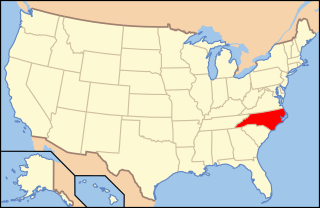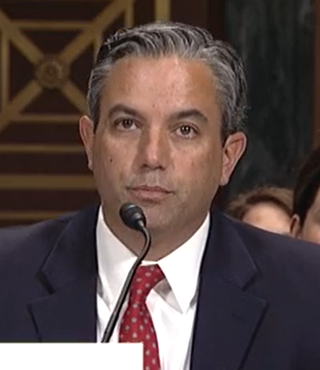
The United States District Court for the Middle District of North Carolina is a United States district court with jurisdiction over 24 counties in the center of North Carolina. It consists of five divisions with a headquarters in Greensboro, North Carolina.

James Andrew Wynn Jr. is an American jurist. He serves as a United States circuit judge of the United States Court of Appeals for the Fourth Circuit and formerly served on both the North Carolina Court of Appeals and the North Carolina Supreme Court.

James Gooden Exum Jr. also known as Jim Exum is an American jurist who served on the North Carolina Supreme Court from 1975 to 1994, and as chief justice from 1986 to 1994.
A trigger law is a law that is unenforceable but may achieve enforceability if a key change in circumstances occurs.

William Joseph Bauer is an inactive senior United States circuit judge of the United States Court of Appeals for the Seventh Circuit in Chicago and previously a United States district judge of the United States District Court for the Northern District of Illinois.

Howard Frederic Sachs is a senior United States district judge of the United States District Court for the Western District of Missouri. He also is a former federal judicial nominee to the United States Court of Appeals for the Eighth Circuit.

Frank William Bullock Jr. is a former United States district judge of the United States District Court for the Middle District of North Carolina.

Henry Franklin Floyd is a senior United States circuit judge of the United States Court of Appeals for the Fourth Circuit.
William Lindsay Osteen was a United States district judge of the United States District Court for the Middle District of North Carolina.
Norwood Carlton Tilley Jr. is a senior United States district judge of the United States District Court for the Middle District of North Carolina.

The legality of abortion in the United States and the various restrictions imposed on the procedure vary significantly, depending on the laws of each state or other jurisdiction, although there is no uniform federal law. Some states prohibit abortion at all stages of pregnancy, with few exceptions; others permit it up to a certain point in a woman's pregnancy, while some allow abortion throughout a woman's pregnancy. In states where abortion is legal, several classes of restrictions on the procedure may exist, such as parental consent or notification laws, requirements that patients be shown an ultrasound before obtaining an abortion, mandatory waiting periods, and counseling requirements.

Catherine Diane Caldwell Eagles is the chief United States district judge of the United States District Court for the Middle District of North Carolina and a former Superior Court judge in Guilford County, North Carolina. She is the first female judge to serve in the Middle District.

Robert Lee Pitman is an American attorney who serves as a United States district judge of the United States District Court for the Western District of Texas. He is a former United States attorney for the Western District of Texas. He was previously a United States magistrate judge of the same court.

Carlton Wayne Reeves is a United States district judge of the United States District Court for the Southern District of Mississippi and chair of the United States Sentencing Commission.

Lesbian, gay, bisexual, transgender, and queer (LGBTQ) people in the U.S. state of North Carolina may face legal challenges not experienced by non-LGBTQ residents, or LGBT residents of other states with more liberal laws.

Max Oliver Cogburn Jr. is a United States district judge of the United States District Court for the Western District of North Carolina.

William Lynn "Chip" Campbell Jr. is an American lawyer who serves as the chief United States district judge of the United States District Court for the Middle District of Tennessee.

Arthur Marvin Quattlebaum Jr. is a United States circuit judge of the United States Court of Appeals for the Fourth Circuit. He was formerly a United States district judge of the United States District Court for the District of South Carolina.

Rebecca Christine Grady Jennings is a United States district judge of the United States District Court for the Western District of Kentucky.
As of July 1, 2023, abortion in North Carolina is currently illegal after 12 weeks of pregnancy. In the case of rape or incest, abortion is legal through the 20th week of pregnancy. In the case of a "life-limiting" fetal abnormality, abortion is legal through the 24th week of pregnancy. If the woman's life is determined by a qualified physician to be at risk, abortion is legal at any stage of pregnancy. North Carolina is destination for many out-of-state women seeking abortions, as most US Southern states have implemented laws banning abortion after six weeks of pregnancy or near-total prohibitions on abortion.















